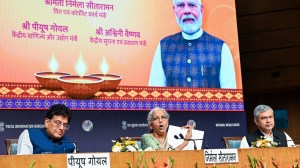Fallacy of the Hindu bomb
Senator Akram Zaki, chairman of the Senate Standing Committee on Foreign Affairs, and a host of others in Pakistan have with stunning simpli...

Senator Akram Zaki, chairman of the Senate Standing Committee on Foreign Affairs, and a host of others in Pakistan have with stunning simplicity seen the installation of the BJP government in New Delhi as the confirmation of a "Hindu India". From this their logic takes them to the conclusion that the bomb India now possesses is a Hindu bomb which requires an adequate "Islamic" response.
Those in India who are tempted to exult at the notion of a Hindu bomb must ask themselves the following questions:
What is it that we mean by a Hindu India and therefore a Hindu bomb? More to the point, what is it that the Pakistanis mean by that term? Why are the authors of Pakistani statecraft so eager to plaster us in saffron?
A country as ancient and diverse as India, where the denominations on every currency note has to be inscribed in at least fifteen languages, each with its own classical literature, does not lend itself easily to a simple definition. Young nations like Australia and Canada can be content withadvertising "multiculturalism" as their national definition. An ancient civilisation like India has a difficulty accepting even accurate descriptive phrases like "unity in diversity" as a definition of its core. Growing regionalism, casteism and communalism further aggravate anxieties — who or what are we?
In spite of all the diversities, there are some elements that are common to all Indians: rivers like the Ganga, Cauvery, the Himalayas and the oceans lapping our shores are part of every Indian folklore. Ghalib describes Varanasi as the beautiful woman who sees her face in the mirror of the Ganga every morning and evening. He calls it the kaaba of Hinduism. To this extent both the Ganga and Varanasi are part of the lore of Urdu and Persian literature written in India. Such examples abound.
Ghalib’s muse, whether in Urdu or Persian, rests on the secure sub-stratum which is basically Hindustani or Indian. Is Ghalib therefore amenable to being defined as a creature of what is sought to be givencurrency as Hindu civilisation? Like all Indians, Ghalib has multiple identities. Broadly speaking, he remains the central column of Urdu culture which itself was reared in the larger crucible of Hindustani civilisation.
A difficulty arises when, in our impatience we seek to impose on him the label of "Hindu" in civilisational terms. The entire gamut of relationships between civilisation, religion and culture is so complex that quick-fix definitions, conditioned by a pursuit of political agendas, will be divisive and debilitating.
When this definition of a Hindu nation and a Hindu bomb is imposed on us by the Pakistani establishment, we better be on our guard instantly. If we respond with anger and irritation to the atmosphere of Jehad being whipped up around the cry for an "Islamic bomb", we will have walked straight into the Pakistani trap.
Seanator Akram Zaki says now that a Hindu India and a Muslim Pakistan are a reality, the two-nation theory has been "proved to the hilt". And "our legitimacy onthe Kashmir issue has become more clear", he concludes.
What the Pakistani senator is saying is this: so far the absence of a well-defined, Hindu theocratic state was a problem for us. We had no backdrop for our definition as a theocratic Islamic state. We become secure as an Islamic state only when they, the Indians, emerge in bold relief as a Hindu state. In other words, only when India has been plastered in a saffron hue do we, as Pakistanis, become secure as a nation.
The Hindu India of Pakistan’s dreams, therefore, is the one that strengthens Pakistan. A stronger shade of saffron, by this logic, strengthens Pakistan that much more. It is a Pakistani project.
Look how Senator Zaki sustains his logic by carving out Kashmir for Pakistan in this clear-cut Hindu-Muslim division of the subcontinent. The logic is elementary. Now that we have a Hindu India and a Muslim Pakistan, the Muslim-dominated territory of Kashmir, sandwiched between the two, becomes Pakistan’s by right on the principle of religiouscontinuity and contiguity.
Pakistan’s incantation of a Hindu India and a Hindu bomb is designed to weaken us in three ways.
First, it seeks to drive a wedge between the majority and the minorities in the country.
Secondly, repeated incantation of the mantra (a Hindu bomb as opposed to an Islamic bomb) is expected to strike a chord among some members of the OIC.
And thirdly, it is meant to add a few decibels to the shrill lobbying on Kashmir.
Unfortunately even in many western societies the soil is fertile for this sort of propaganda to take root. For this state of affairs some blame must lie at the door of the western media. It is meant to isolate India from the Muslim countries.
Explaining the cavernous complexities of a pluralist, multilingual, multireligious, multiethnic society like India would require so many explanatory paragraphs that all the space available for a South Asia story would be exhausted in the exercise. The western media has, therefore, fallen back on journalisticshorthand. The new ruling establishment in New Delhi has been universally advertised as a "Hindu-nationalist government."
However, there is thick band of silver in the cloud. The basic pre-condition for the machinations of someone like Senator Akram Zaki to succeed simply does not obtain here. We would have to be a nation of idiots to allow such simple tricks to succeed.
Over the past decade our diplomacy has rested on that unfailing mantra: Indian pluralism protects among a billion others over 130 million Muslims, which makes us the world’s second largest Muslim population greater than the population of Pakistan. An approach to any question including that of Kashmir must take into account this vital fact. A theocratic approach would strain the social fabric which keeps India together, Kashmir et al.
The larger, complex, Hinduism I referred to at the outset is a matter of internal debate and refinement. The narrow Hinduism Senator Zaki seeks to impose on us and for which there are some takers among ouruninformed hot heads is debilitating for the national purpose. Caution dictates that for the time being we steer clear of all the alluring fantasies of a Hindu bomb. This bomb must forge the widest possible national consensus.



- 01
- 02
- 03
- 04
- 05




























